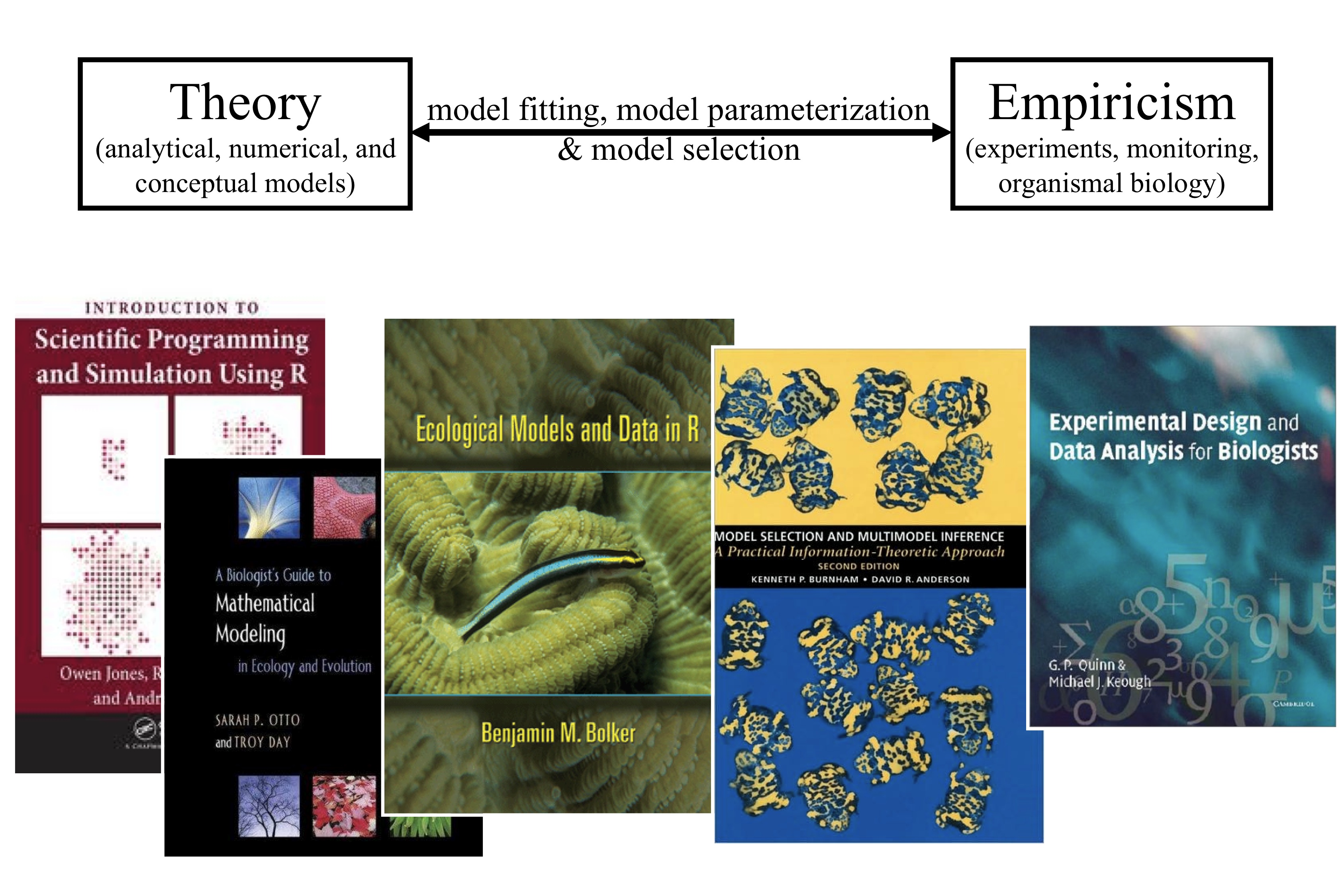Methodological Approaches to Research
Interplay between Theory and Empiricism
Central to my research program is the interplay between theory and empiricism, including the development of theories and concepts that can guide empirical studies, and for which empirical work can validate, refute, or lead to their refinement. As exemplified by centuries of research in physics, such interplay between theory and empiricism can aid in the advancement of a discipline. To this end, I aim to advance knowledge of ecology and evolutionary biology by integrating theory and empiricism through multiple synergistic and quantitative approaches to research, including empirical field biology, theoretical biology, computational biology, systems biology, and network science. For this reason, I maintain interests in interdisciplinary collaborations at the interface of multiple facets of biology, mathematics, statistics, physics, computer science, network theory, environmental science, and among others earth science.

Computational Biology
Computational biology is the development and/or application of quantitative techniques from interdisciplinary fields of statistics, mathematics, and computer science to theoretical and empirical analyses of biological systems, often involving analytical, numerical, and statistical computer models. In using a computational biology approach, I employ quantitative methods from such disciplines to conduct theoretical studies involving conceptual, analytical, and simulation models; empirical field studies involving experiments, long-term monitoring, and organismal biology; and studies integrating theory with empirical data using modern computational and statistical techniques for model fitting, parameterization, and model selection. Some tools I use include R, SAS, and Matlab, and range from standard frequentist and information-theoretic statistics to symbolic and numerical mathematics.
Empirical Field Biology
My research program also entails empirical field studies of interspecific interactions within and across multiple levels of biological organization. Hypothesis and questions guiding my empirical field work are governed by theory, model predictions, and the natural history and organismal biology of the plant and animal systems that I study. Likewise, the theories I develop are equally guided by my empirical studies. My field work examines relationships between response and explanatory variables using a variety of methods and experimental designs, ranging from simple single-variable manipulations and multi-factorial experiments to observational studies and short- and long-term monitoring of natural (unmanipulated) phenomena in nature. I employ a variety of statistical methods as appropriate for the particular study and data analysis, including standard frequentist, maximum likelihood, and information-theoretic statistics.
Theoretical Biology
Theoretical and mathematical biology concern the depiction, study, and modeling of biological patterns and processes using a variety of symbolic and numerical mathematics, including for example analytical, numerical, simulation, matrix, and individual-based computer models. By no means am I a mathematician, but I do employ some of these quantitative approaches to address ecological and evolutionary questions of my research, particularly if theory is lacking, needs improvement, or modification based on empirical knowledge.
Systems Biology
Systems biology is concerned with the study of interactions among component parts of a biological system, and how such interactions contribute to the structure, function, and behavior of the system as a whole, often including emergent properties arising from the multiplicative effects of interactions among the component parts. Using a systems biology approach, I am not only obtaining mechanistic insights into interspecific interactions by decomposing their population biology into underlying component parts (reductionism), but I am also gaining insights into emergent structures of food web modules and ecological networks by studying the broader abiotic and biotic contexts of ecological systems (holism).
Network Science
Network science/theory is a newly emerging field of study that examines the structure (patterns) and function (dynamics) of graphs that represent a system (network) of interconnections (edges) among discrete objects (nodes). With historical roots in graph theory and topology mathematics, network theory is now being applied in diverse disciplines ranging from the humanities and social sciences to physics, chemistry, and computer science. Yet, only in more recent years has network theory, terminology, and analyses begun to be applied in the biological sciences, including such systems as sub-organismal networks of proteins, genes, and metabolites and ecological networks of interactions among organisms, interactions between species, and multi-species interactions of communities. Though previously not expressed in network terminology, intra- and interspecific interactions inherently entail nodes (organisms, species) and edges (interactions, links, or connections) between nodes, whether they be simple pairwise interactions or complex multi-species communities (networks). Network theory is providing a general framework for new insights into the ecology and evolution of interactions (edges) among species (nodes) of communities (networks). I am using a network approach to study the ecology and evolution of the structure and dynamics of organismal interactions within populations, interactions between populations of species, and multi-species interactions within communities.